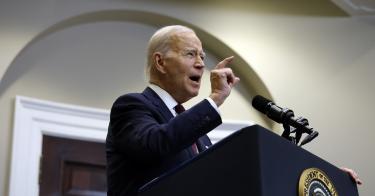The Supreme Court “has effectively ended affirmative action in college admissions,” President Biden said in the wake of its opinion in Students for Fair Admissions v. Harvard, “and I strongly—strongly disagree.”
Indeed, he added, “We cannot let this decision be the last word,” and he urged college and university administrators to “continue their commitment to support, retain, and graduate diverse students and classes.”
Was this a dog whistle to those administrators to defy the court and continue their racially discriminatory practices?
If so, that would be disturbingly reminiscent of what segregationists did after the Supreme Court’s 1954 decision in Brown v. Board of Education. That is what the Students for Fair Admissions case was all about—ending the practice of colleges like Harvard and the University of North Carolina using race and ethnicity in the admissions process, benefiting some students and punishing others based on the color of their skin.
There was another chief executive who was displeased when the Supreme Court issued an opinion that ran contrary to his views on race. In his inaugural address in 1963 as Alabama’s newly elected governor, George Wallace said, “What I have said about segregation goes double this day … and what I have said to or about some federal judges goes triple this day.”
>>> Here’s How Biden Admin Is Evading SCOTUS’ Affirmative Action Ban
As Wallace said in a campaign speech, “As your governor, I shall resist any illegal federal court order, even to the point of standing at the schoolhouse door in person, if necessary.”
This was based on Wallace’s belief that race can and must be used in determining admissions to college, and he certainly did everything in his power to prevent schools from accepting the Supreme Court’s ruling in Brown.
Whatever you may think about the benevolence or maliciousness of Mr. Biden’s and Wallace’s intentions, race discrimination is race discrimination.
Both men’s criticism of the Supreme Court is based on their belief that students should be treated differently based on their race and ethnicity and that this skin-deep difference should be an essential component in college admissions.
“While the court can render a decision, it cannot change what America stands for,” Mr. Biden said.
What exactly does he think America stands for? Discrimination by race? Penalizing hardworking students like those kept out of Harvard and the University of North Carolina because they were Asian American?
That is not what the America we believe in “stands for.”
Diversity of thought is certainly essential to the academic environment. But “woke” universities have shown they are not interested in diversity of thought. And as the Supreme Court pointed out in the Harvard decision, that is not the definition of diversity used by academic administrators.
Universities define diversity based solely on the racial proportions of their student population. In doing so, they “unavoidably employ race in a negative manner” that involves “racial stereotyping,” according to the Supreme Court. The idea that race-based admissions will provide diversity of thought and viewpoint is based on the “offensive and demeaning assumption that [students] of a particular race, because of their race, think alike,” the court aid.
Yet that is exactly what the president of the United States is telling administrators to continue to do.
>>> Colleges Should Ignore the Biden Administration’s Post-Affirmative-Action Sniping
Unfortunately, these sentiments can be found in academia, with Harvard law professors Mark Tushnet and Aaron Belkin openly calling for the Biden administration to ignore the Supreme Court’s decision, claiming that when the justices issue rulings that are “based on gravely mistaken interpretations of the Constitution that undermine our most fundamental commitments, the Administration will be guided by its own constitutional interpretations.”
Echoing a similar sentiment of defiance, college administrators such as the dean of Princeton University have promised that Princeton will pursue diversity “with energy, persistence, and a determination to succeed despite the restrictions imposed by the Supreme Court in its regrettable decision today.”
Will Princeton do everything it can to resist the Harvard decision and continue to make admissions decisions based on race?
There was a time when other government officials, schools and universities engaged in “massive resistance.” Following the Supreme Court’s decision in Brown, many officials thumbed their noses at the court, including Sen. Robert Byrd, the West Virginia Democrat who organized a coalition to sign on to his “Southern Manifesto” to resist the implementation of Brown.
As the Supreme Court said in the Harvard decision, “universities have for too long” not treated students as individuals but have “concluded, wrongly, that the touchstone of an individual’s identity is not challenges bested, skills built, or lessons learned but the color of their skin.”
As Chief Justice John Roberts stated in an earlier case, “The way to stop discrimination on the basis of race is to stop discriminating on the basis of race.”
As the Supreme Court has directed, the time to end these pernicious and unconstitutional discriminatory admissions practices is now.
This piece originally appeared in The Washington Times



